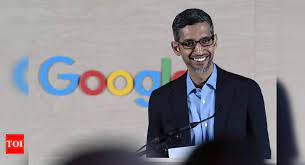Pichai claims that employing AI to organize the world’s knowledge is Google’s next challenge and that it will be the “biggest technological shift in our lifetimes.. even bigger than the internet itself.”
Sundar Pichai, the CEO of Google, has referred to artificial intelligence as “the biggest technological shift” of our lifetimes and stated that incorporating it into various products will be the “most important way” for Google to accomplish its objective.

Google celebrates 25 this year. Sergei Brin and Larry Page, both Stanford grads, founded the most widely used search engine in the world with the goal of “organizing the world’s information and making it broadly accessible and useful.”
In a recent blog post, Google CEO Sundar Pichai predicts that “AI will eventually be the biggest technological shift we see in our lifetimes.” It’s more significant than the change from desktop to mobile computing, and it might even dwarf the internet itself. It’s a fantastic catalyst for human invention and a fundamental rewiring of technology.
Machine learning, which involves giving enormous quantities of computer power and data to software systems in order to build brain-like networks that overcome the limits of human intelligence and memory, is poised to change every area of human effort, from predicting stock market moves to producing art.
It’s interesting to note that Google’s cash cow, search, is one of the major industries AI is projected to challenge.
Currently, there are two processes involved in getting any answer: first, performing a search on a search engine like Google, and second, visiting each page that comes up in the search and manually finding the answer.
However, a number of AI engines, most notably OpenAI’s ChatGPT, offer to significantly streamline the aforementioned procedure by condensing it to a single step: Ask the query in chat and receive the response right away without visiting any external websites. instead of the person making the query, the AI engine does the task of visiting external websites, analyzing the content there, filtering, processing, and assessing it, and determining whether it is relevant to your question.
But among the many areas that may experience major disruption is search.
Most of the current human ‘jobs’ and sources of income will become obsolete as a result of sophisticated and highly capable learning models.
At the same time, Pichai said, Google is also aware of the possible risks from the misuse of such technology.
“We understand that AI, like any early technology, poses complexities and risks,” he said. “Our development and use of AI must address these risks, and help to develop the technology responsibly…For example, just last week we introduced SynthID, a tool for watermarking and identifying AI-generated images, which will help address an important issue around transparency.”

